As of March 20, spring is officially here. With the new season comes blooming flowers, green grass and barbeques — also, sneezing coughing, watery eyes and congestion. Spring allergies are no joke, especially in North Texas.
A study by the Asthma and Allergy Foundation of America (AAFA) (via CBS Texas), Dallas is the second city with the worst allergies, just behind Wichita, Kansas.
The study determined that Dallas is home to a high pollen count and a large number of medicated residents. But because of the large number of allergy specialists in the area, the ranking fell to second; whereas Wichita did not have many specialists.
But some cities are easier to live in for those with pesky allergies. AAFA found that Buffalo, New York, is the least challenging city for those with allergies. Other cities with more well-off rankings include Seattle; Cleveland; Austin, Texas; Akron, Ohio; Washington, D.C.; Detroit; Albuquerque, New Mexico; Columbus, Ohio and Salt Lake City.
According to AAFA, allergic conditions are among the most common medical conditions affecting people in the United States. In fact, more than 100 million Americans are affected by various types of allergies every year.
One of the most common allergic conditions is seasonal allergic rhinitis, often called “hay fever.” About 26% of adults and 19% of children have been diagnosed with seasonal allergic rhinitis in the U.S.
Symptoms include:
• Sneezing
• Stuffy nose (due to blockage or nasal congestion)
• Runny nose (also known as rhinorrhea – usually a thin, clear discharge)
• Red, and watery eyes
• Itchy nose, eyes, ears or mouth
• Swelling around the eyes
There is no cure for allergies, but they can be managed with prevention and treatment. A good allergy treatment plan is based on medical history, the results of allergy tests and symptom severity. If you suffer from allergies, consult with a specialist to find the right treatment plan for you.




